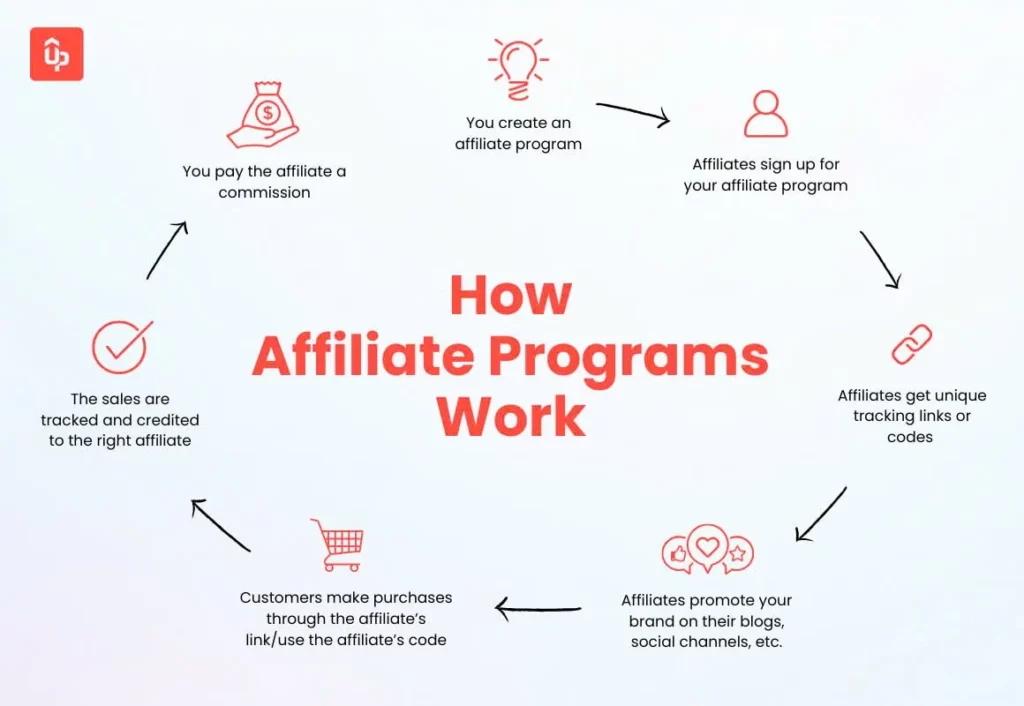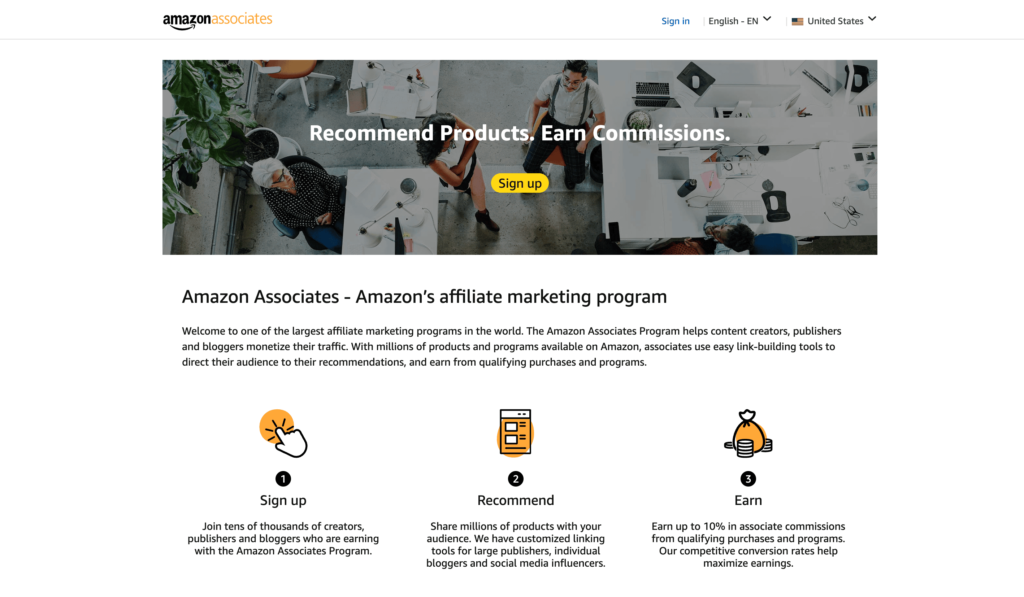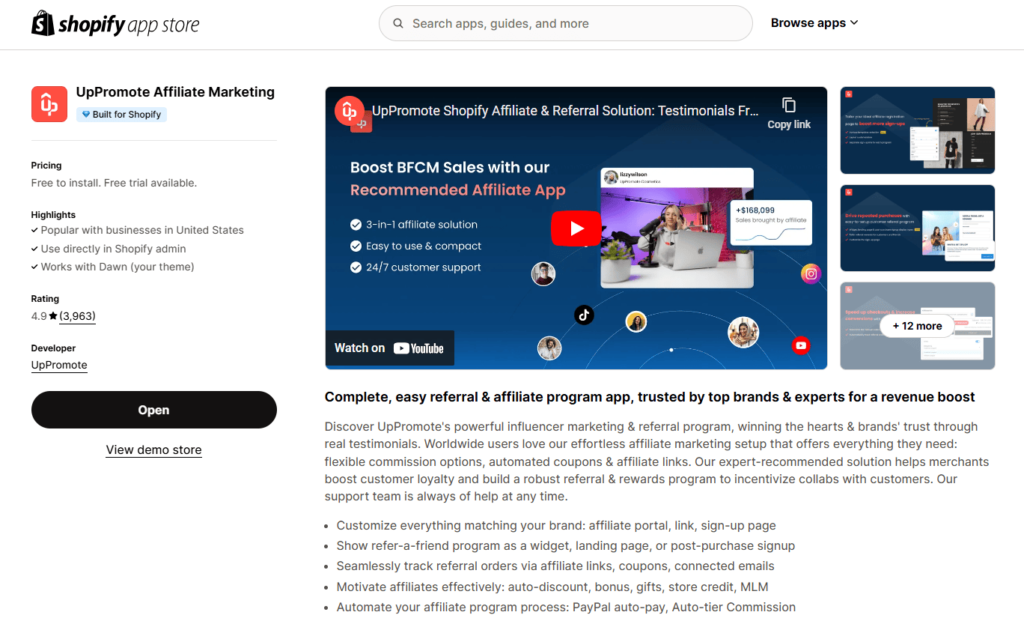As a business owner, you always search for ways to grow your sales and reach more customers. Two strategies that often come up are affiliate marketing and partner marketing.
They sound similar, but they work in very different ways. If you’re wondering which one is right for your brand, you’re in the right place.
In this article, we’ll explain what affiliate marketing and partner marketing are, show you real examples, highlight their differences and similarities, and help you decide the best fit for your brand.
The key distinction is that affiliate marketing offers quick, cost-effective growth with no upfront cost and minimal risk, while partner marketing delivers deeper collaboration and long-term gains, ideal for large brands or those ready to invest.
Looking to increase sales quickly without significant upfront investment? Affiliate marketing is a smart choice.
The best part? No prior experience is needed. With affiliate management software, you can easily set up an affiliate program, track referrals automatically, and analyze performance data to optimize your strategy. Check out UpPromote, the top trusted Shopify affiliate solution for growth, with a 4.9/5 rating and over 4,000 reviews, to make the process even easier.
Quickly find top affiliate marketers, grow your network, and boost your sales with UpPromote without financial stress.
What is Affiliate Marketing?
Affiliate marketing is a simple idea: you (the merchant) team up with someone (the affiliate) to promote your products or services. The affiliates use their own platforms—like a blog, YouTube channel, or Instagram—to share your products with their audience. When customers buy through their unique affiliate link, you pay them a commission. The collaboration benefits both sides: they earn money, and you get sales.
Here’s how it works:
- You create an affiliate program: You give affiliates a unique link to track their sales.
- Affiliates spread the word: They write reviews, make videos, or post about your product.
- You get a sale: When someone clicks their link and buys, the affiliate gets paid for their efforts.

For brands, affiliate marketing delivers many great benefits. It’s budget-friendly, low-risk, and high return on investment since you only pay when affiliates bring actual sales.
A Real-world Example of Affiliate Marketing
A popular example of affiliate marketing is the Amazon Associates program.
Amazon lets anyone—bloggers, YouTubers, influencers, or even regular people—sign up to be their affiliates and promote their millions of products. Now, this is one of the most well-known affiliate programs in the world, with over 900,000 affiliate partners.

Affiliates share Amazon products on their websites, blogs, or social media channels. When a customer clicks on the affiliate link and then purchases on Amazon, the affiliate earns a commission based on the order value.
 What is Partner Marketing?
What is Partner Marketing?
In simple terms, partner marketing is when two or more businesses collaborate to co-create value and help each other grow.
Rather than paying someone just for a sale, they collaborate on bigger goals—like launching new products, sharing customers, or building their brands. The focus remains less on quick cash and more on long-term success.
Partner marketing involves deeper relationships, such as:
- Co-branding: Two companies create something new together.
- Event sponsorship: Partners team up to host or fund an event.
- Integrated solutions: Companies combine their products or services into one package.
- Referral partnerships: One brand sends customers to the other with special offers
- Joint campaigns: Businesses run ads or promotions together.
For business owners, partner marketing builds trust and opens doors to new markets. However, it takes more investment in time and resources to develop and maintain these partnerships.
A Real-world Example of Partner Marketing
A famous example is the partnership between Nike and Apple. They teamed up to make Nike+, a line of products that combines Nike’s sports gear with Apple’s tech—like fitness apps and smartwatches.
Thanks to the collaboration, Nike got to sell more shoes to tech fans, and Apple reached fitness buffs who might not have bought their gadgets otherwise.

Key Differences Between Affiliate vs Partner Marketing
Even though affiliate marketing and partner marketing both help your brand grow, they’re not the same.
Let’s take a look at how they differ:
| Key difference | Affiliate Marketing | Partner Marketing |
| Collaborators |
|
|
| Relationship Depth |
|
|
| Goals Pursued |
|
|
| Level of Involvement |
|
|
| Payment Model |
|
|
| How to Create & Manage |
|
|
| Cost |
|
|
Here’s a breakdown of the key differences between them in more detail:
Collaborator Type
In affiliate marketing, you mostly team up with individuals. They could be bloggers, content creators, or influencers. These people use personal channels to promote your products to their followers and earn passive income.
On the other hand, partner marketing teams work with other businesses. These companies develop unique products or services and serve a distinct customer base, ready to join forces with you for new growth opportunities.
Relationship Depth
In affiliate marketing, the relationship stays mostly transactional. Affiliates focus on promoting your products, getting paid for each sale or action, and that’s it. They usually work independently and build promotional campaigns themselves. You don’t need to guide them much, handing over your brand info, affiliate links, discount codes, and sometimes marketing materials.
Partner marketing, however, builds on strategy and teamwork. It demands deeper engagement and shared goals. You and your partner team up to plan product development, co-marketing campaigns, and more for mutual benefit
Goals Pursued
Affiliate marketing focuses on quick wins—driving sales or leads fast. It’s all about getting results right away to boost your revenue.
Partner marketing takes a broader view, aiming for long-term growth. It can involve different efforts beyond sales, like building your brand or reaching new markets together.
Involvement Level
Affiliates stick to marketing and promoting your products. They don’t influence your product development or how your business runs at all.
Partners, however, go beyond marketing with a deeper role. They might contribute to product launches, customer service, marketing strategies, or other areas, taking a more active part in your operations.
Payment Model
Affiliate marketing keeps it simple: you pay affiliates a commission tied to specific actions, like sales or leads.
Partner marketing is more flexible. Payment could be revenue sharing, profit splits, or flat fees. It depends on the deal and the funds your partner invests.
How to Create & Manage
Affiliate marketing is quick and easy to start. You can use affiliate marketing software to set up a program, automatically track referral sales, and get real-time reports and analytics on affiliate performance to optimize your campaign.
Partner marketing requires more time and effort. You need to identify a compatible brand with aligned goals, settle terms, and oversee joint projects, such as product launches or service improvements. Since partners join in diverse efforts beyond quick sales, measuring their impact often proves more challenging.
Cost Involved
Affiliate marketing has no upfront cost. You only pay affiliates if they bring actual sales. And if you want to run your affiliate campaign smoothly and effectively, you can invest in an affiliate management tool. While many apps charge a fee, UpPromote, the top trusted Shopify affiliate solution for growth, recommended by experts and used by over 115,000 customers worldwide, lets you start the app for free to tap into affiliate marketing without financial stress.

Partner marketing, though, calls for a hefty investment from your brand. In co-marketing efforts, partners split costs for ads, events, and outreach, adding up to a sizable commitment. This requires gearing up for major upfront expenses tied to such broad collaboration.
Similarities Between Affiliates and Partners Marketing
Despite their differences, affiliate and partner marketing have some things in common. That’s also why you can fail to distinguish between the two.
Here’s what they share:
- Reach new customers: Both help your brands find people you couldn’t reach alone. Affiliates bring their followers; partners bring their customer base.
- Use word-of-mouth power: Both rely on trusted recommendations to attract customers. Most people trust suggestions from third parties—like affiliates or partners—more than ads straight from your business. Whether it’s an affiliate sharing a link or a partner recommending your brand, their word carries weight because they’re not your employees.
- Pay for results: With affiliates, they receive commissions for each successful sale, sign-up, or lead resulting from their promotional efforts. With partners, they can earn a share of the revenue from the success of joint projects.
- Collaborate with clear rules: Affiliates and partners sign a contract with you before starting the partnership. You’ll create an affiliate agreement for marketers. Meanwhile, you draft a collaboration contract for partners. These legal documents lay out terms and conditions, detail each side’s duties, and explain how to handle disputes and issues. This keeps the process fair and safeguards your business.
Affiliate Vs Partner: Which Suits Your Business?
Now comes the big question: which strategy should you choose?
To answer this question, you can consider the following aspects:
Business Size
Small and Medium-Sized Businesses (SMBs)
For SMBs, affiliate marketing offers an accessible and cost-effective entry point. Its low upfront costs and pay-for-performance model make it a great choice for rapid sales growth and quick conversions with a tight marketing budget and limited resources. However, effective affiliate management is essential to maintain quality and prevent affiliate fraud.
On the other hand, partner marketing is also a viable option but requires strategic partner selection. It suits businesses looking to build local relationships and access niche markets. Yet, it demands significant time and resource investment for partnership development.
Large Brands and Enterprises
Large brands and enterprises often prioritize partner marketing for strategic growth and long-term relationships while utilizing affiliate marketing to scale their business. With their substantial resources and budgets, they can execute both strategies effectively.
They can use affiliate marketing as part of a broader omnichannel strategy to leverage an extensive affiliate network to increase sales and brand visibility.
Partner marketing is ideal for building strategic alliances and entering new markets. It fosters innovation, business growth, and enhanced competitive advantages.
Business Goals
Affiliate Marketing:
- Perfect for quick sales boosts and immediate conversions.
- Good for promoting specific products or offers, especially in peak shopping seasons.
Partner Marketing:
- Best for building brand strength and expanding markets over time.
- Ideal if you want to create synergistic relationships and offer a more comprehensive value proposition.
Type of Products and Target Audience
Affiliate Marketing:
- Great for reaching a wide audience through a network of affiliates.
- Best for businesses targeting ready-to-buy customers.
- Works well for products that are easy to sell online, such as trendy gadgets or books.
Partner Marketing:
- Ideal for targeting niche audiences through strategic partnerships.
- Perfect for offering complex solutions to customers with specific needs.
- Fits well with complementary or intricate offerings, like software bundles or consulting services.
Wrapping Up
In short, the distinctions between affiliate and partner marketing may not always be clear for businesses. But as we’ve walked you through the maze, we hope you understand both methods better.
Both aim for your brand’s growth and success, yet they follow distinct paths with different goals.
So, affiliate or partner, or a mix of both? Your decision hinges on your aims, resources, desired collaboration level, and other key aspects. Choose wisely to pave the way for a rewarding outcome.


 What is Partner Marketing?
What is Partner Marketing?





